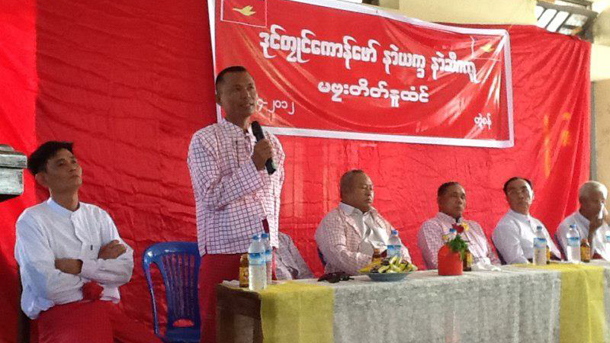A former Mon political prisoner has been greeted as a hero upon his return home by local people who support his stand challenging the former Burmese military dictatorship.
Nai Yehka was welcomed by hundreds of people from different townships of Mon State after he was released under the terms of a ceasefire agreement on April 30. Originally sentenced to death for his alleged role in a Rangoon bomb plot, his sentence was later commuted to life imprisonment.
And despite now being 53 years old having spent the last eight years and nine months far away from his family in Rangoon’s notorious Insein Prison, Nai Yehka has vowed to continue fighting for greater autonomy for the Mon People.
“I got arrested because our political activity moved up to another level,” said Nai Yehka. “[The military intelligence] did not have many things to ask me during interrogation. They just kept asking me about the NMSP [New Mon State Party], not about plotting to plant bombs.
“They sentenced me to death because they wanted to kill my mind. They would win this game if I lost my mind in prison,” he said.
Many Mon living in Burma and abroad have expressed happiness to get their man back again as they thought he would end his life in prison. Some also worried that if he was ever released, he would not be the same person after suffering torture while incarcerated.
“I am very happy after I talked to him on the phone,” said ethnic Mon rights activist Nai Bee Htaw Monzel from Denmark. “His voice is very normal and still strong. He is still our man like in the past. We got back our real man.”
Three townships near his home have already held ceremonies to welcome Nai Yehka home, with another celebration scheduled for Wednesday.
Nai Yehka was accused of planting a bomb in Rangoon by the Burmese military junta and arrested in July, 2003. He told The Irrawaddy that his arrest was planned by the former military intelligence chief Gen Khin Nyunt.
“I traveled in Rangoon for a meeting to do with my rubber trading business at that time,” he said. “Before that, I met one man in Moulmein and we talked about the rubber trading business. But I was not aware that the man was really from military intelligence and actually planned to arrest me.”
Nai Yehka explained that he was seized as soon as he arrived at his arranged appointment at an office on the first floor of a Rangoon building.
“Around 30 [military intelligence and police] pointed guns at me and my friend and arrested us,” he said. “They took us to a room and put a box in front of us, which inside contained bombs. There were big bombs inside the box and they took photos at the same time. This is how they accused us of plotting to plant bombs in Rangoon.”
Five people were arrested with Nai Yehka in the building. However, he later heard two other people he did not know—Min Kyi, a political activist, and Zaw Htet Htaw, a Rangoon journal editor—were also arrested in connection with this case.
Nai Yehka was a tutor at the University of Moulmein, and later became a Mon rebel after the 1988 student uprising in Burma. Then he joined the NMSP ethnic armed group and was a committee member for Moulmein District.
He was a well known figure who was admired by his peers for courageously challenging the dictatorship, and worked with local Mon youth though the party’s underground network. After his arrest, the NMSP’s network almost collapsed as many people fled to other countries from fear they would be detained by the Burmese military.
Local people referred to him as “A Yit,” meaning “smoke” in the Mon language, in reference to his ability to hide his network very quick and move to different locations without being detected by military intelligence.
Nai Yehka’s wife is a school teacher and his has three children. He will meet the NMSP leadership at their headquarters on May 20 to discuss his new role within the party. He said that although there is political change in Burma, he still could not trust the government.
The NMSP asked the Burmese government to release two Mon political prisoners as part of a peace deal party signed on Feb. 25 and is still engaged in political talks with Naypyidaw.

















